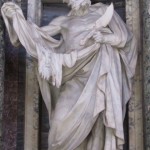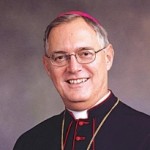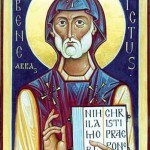
A prayer of St. Anselm: “Come now, little man, turn aside for a while from your daily employment, escape for a moment from the tumult of your thoughts. Put aside your weighty cares, let your burdensome distractions wait, free yourself awhile for God and rest awhile in him. Enter the inner chamber of your soul, shut out everything except God and that which can help you in seeking him, and when you have shut the door, seek him. Now, my whole heart, say to God: “I seek your face, Lord, it is your face I seek.”
— Proslogion, prologue (Source: Magnificat Magazine)
In all these years I have never made the acquaintance of St. Anselm (c1033-1109) until this month, and then thanks to Magnificat Magazine and the Office of Readings in my breviary. Having met him, I am charmed, intrigued and a little awestruck, and more-so each time I dip into his thoughts a bit further.
Anselm’s feast day was April 21, and each day since then I have meant to share him with you; the month should not slip away without making the introduction.
I was surprised to learn that Anselm was an Italian – Anselmo de Candia Ginevra, of Northern Italy. Perhaps because he had been Archbishop of Canterbury, I had gotten it into my head that he was English. He was also a Benedictine Abbot, declared a Doctor of the Church by Pope Clement in 1720.
But you can find that information anywhere. What intrigues me is his writing; it is so lively and wide-awake and even a little bit fond, or playful. See the rest of that prologue with which we began:
O, Lord my God, teach my heart where and how to seek you, where and how to find you. Lord, if you are not here but absent, where shall I seek you? But you are everywhere, so you must be here, why then do I not seek you? Surely you dwell in light inaccessible – where is it? and how can I have access to light which is inaccessible? Who will lead me and take me into it so that I may see you there? . . . What shall your servant do, eager for your love, cast off far from your face? . . . You are my Lord and my God, and I have never seen you. You have created and re-created me, all the good I have comes from you, and still I do not know you, and I have not yet accomplished that for which I was made.
A Doctor of the Church and Philosopher who is as immediate and accessible our own thoughts.
More, from the Office of Readings for his feastday:
My soul, have you found what you are looking for? You were looking for God, and you have discovered that he is the supreme being, and that you could not possibly imagine anything more perfect. You have discovered that this supreme being is life itself, light, wisdom, goodness, eternal blessedness and blessed eternity. He is everywhere and he is timeless.
Lord, my God, you gave me life and restored it when I lost it. Tell my soul that so longs for you what else you are besides what it has already understood, so that it may see you clearly. It stands on tiptoe to see more, but apart from what it has seen already, it sees nothing but darkness. Of course it does not really see darkness, because there is no darkness in you, but it sees that it can see no further because of the darkness in itself.
Surely, Lord, inaccessible light is your dwelling place, for no one apart from yourself can enter into it and fully comprehend you. If I fail to see this light, it is simply because it is too bright for me. Still, it by this light that I do see all that I can, even as weak ees, unable to look straight at the sun, see all they can by the sun’s light.
The light in which you dwell, Lord, is beyond my understanding. It is so brilliant that I cannot bear it, I cannot turn my mind’s eye toward it for any length of time. I am dazzled by its brightness, amazed by its grandeur, overwhelmed by its immensity, bewildered by its abundance.
Good stuff, right? You can read the rest here
UPDATE:
Reader Sheri sends along a video of Fr. Robert Barron explaining that Anselm taught why the crucifixion had to happen.










